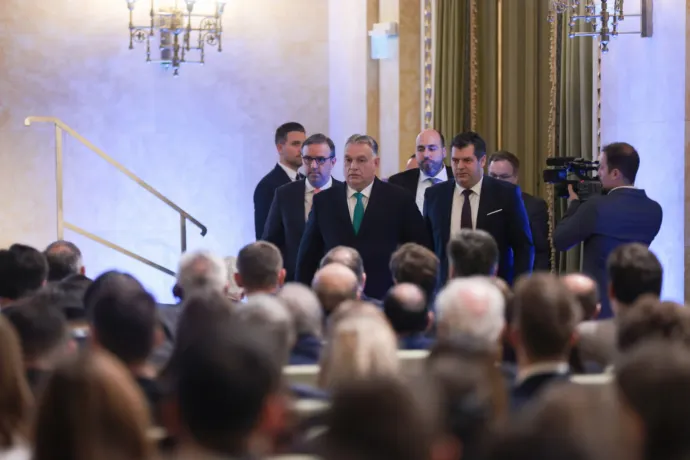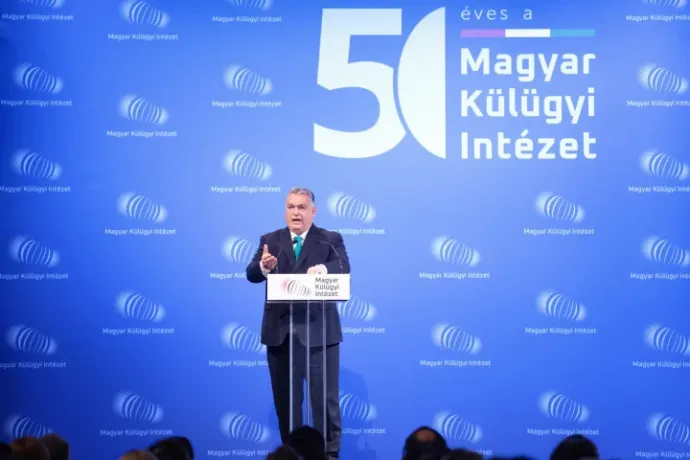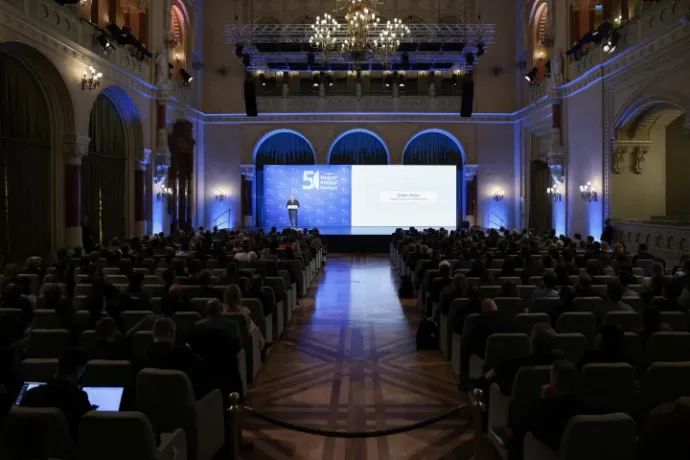
"Delivering the closing remarks at a conference one did not attend is not easy," Hungarian Prime Minister Viktor Orbán said at the Ceremonial Hall of Budapest's Vigadó Palace on Monday afternoon, and then gave a brief answer to the question “So then, what am I doing here at the 50th anniversary conference of the Institute of International Affairs?”
“From now on, the arrangement is that you all work directly for the prime minister.”
Orbán said that this was just a return to Hungary's traditions, which had not "come about by accident". Whenever Hungary was able "to pursue a sovereign foreign policy, it was a foreign policy centred on the prime minister."
The period Orbán referred to cannot have been very long, since according to Hungary's Foundational Law, created by Fidesz, Hungary was not a sovereign country between 1944 and 1990, and beginning in 1867, as part of the Austro-Hungarian Monarchy, Budapest did not have a foreign policy of its own either. The Prime Minister nevertheless mentioned Tisza – although he did not clarify whether he meant Kálmán Tisza, who was Prime Minister between 1875-90, or István Tisza, who was Prime Minister between 1903 and 1905 and again between 1913 and 1917. Even though the latter was reluctant to get involved in the First World War, the step hardly seemed an indication of a sovereign foreign policy. István Bethlen, who orchestrated the consolidation after the Treaty of Trianon, and Count Pál Teleki are more easily identifiable, although the latter's suicide signalled his reservations about getting involved in World War II, which also cannot be classified as a period of a sovereign Hungarian foreign policy.
Be that as it may, Orbán said that the reshuffling of the supervisory authority of the Institute of International Affairs “marks a return to our previous tradition.”
Dare to be greater
"History has determined it so, but Hungary itself also has a tendency to set itself a more ambitious goal than its size and economic performance would dictate." – the Prime Minister said, summarizing his credo.
The "energy, the dynamics, and the power to initiate inherently included in the shaping of external relations" are all indispensable for this.
“In countries with this background, the reins of foreign policy must be held tightly, which means that it's good if the prime minister is the one holding them.”
– Orbán explained, casually taking the reins from the hand of Foreign Minister Péter Szijjártó, who spoke shortly before Orbán. The PM's comment was also a subtle correction of the Minister of Foreign Affairs and Trade, who, in his speech on "the multi vectoral Hungarian foreign policy" said that if he were to summarize this in his own words, he would say that "we should be on good terms with everyone".
"If we are on good terms with everyone, then – thanks to the generosity of the big players – we too will receive a few crumbs from the table. If we do that, we will indeed have a little bit, but others will be the ones making decisions on the issues that are crucial for us."
– Orbán said, putting Sziijjártó in his place in absentia.
He also criticized the pre-2010 governments, noting that they followed the principle of daring to be small.
What is Hungary's interest?
Although it's been repeatedly said that Hungarian foreign policy is based on national interest, the Prime Minister believes it is still worth clarifying exactly what this concept means, if only because the circles providing the background to the Prime Minister's decision-making – such as the Hungarian Institute of International Affairs – can only function well if this is clear to everyone.
Orbán contested the approach that foreign policy can be either idealistic or realistic. Instead, he proposed a "foreign policy based on national interest" that “combines the best elements of idealism and realism.”

However, Orbán's view that "a foreign policy based on national interest must never be dogmatic" – that is, it must be different in every situation – agreed with a previous statement of the PM's political director, Balázs Orbán, and with the contents of the speech given by the Foreign Minister Szijjártó earlier in the day. So what appears to be a contradiction – for example,
supporting Israel in its self-defence struggle against Hamas, but contesting the notion of that same self-defence in the case of Ukraine against Russia – is not inconsistency, but flexibility.
A foreign policy based on national interest is principled, it has value, but it is 'constantly forcing those who hold this view to be flexible'. According to Orbán, this is simply an acknowledgement that Hungary is not big enough or strong enough to be able to claim any authority on the basis of its size alone. Instead, we are left with a wise foreign policy, which Orbán has repeatedly described as "Hungary’s soft power".
As he had previously done with illiberalism, he now proudly raised the adjective "radical" as the trademark of his foreign policy.
With radicalism, you can widen the margin for manoeuvre
"I'm no newcomer to foreign policy, I understand full well that the field of foreign relations is the most sophisticated area of politics, the one which is most subject to appearances and formalities" – it's no accident that the diplomatic protocol has been invented, he said. However, in Orbán's opinion, this should not prevent a country's leadership from making "astonishing statements, asking delicate questions, and making innovative proposals" – this does not violate the norm, “even if it means departing from the path of diplomatic protocol.”
Hungary wishes to pursue an independent foreign policy, even if “in your terminology you would say that our relative superiority is low. It is in the negative.”
Orbán believes that this must be counterbalanced by taking on conflicts. "It is still possible to create a relative superiority out of this, and that's what we are doing" – despite the fact that "Hungary is a country of only ten million people, and that its GDP is what it is, and that its army is the size it is".
The best way to do this, Orbán argued, is radicalism, which he also gave a definition for: it means getting to the heart of the matter when formulating goals. He cited migration as an example: the debate should not be about how to distribute migrants and how to solve integration, but rather about whether it is right to accept migrants at all. According to Orbán, this is radicalism, and it is not rudeness, but simply a cultural anthropological trait of Hungarians, which also has a tactical purpose:
“If we are not radical enough, we will have nothing to concede during the debate.”
Radicalism as soft power
In addition, radicalism also has a strategic purpose: according to Orbán, asking questions in a substantive way "does not diminish Hungary's prestige and esteem, but increases it", because those who do not talk like this, who do not want the "scrimmage" that comes with this, are nonetheless concerned about these issues. Even the average French, German or Italian gets 'carried away' and wonders whether it would be better to go back 30 or 40 years in time, to a Europe before the need to think about the distribution of migrants.

"That's why Westerners are happy to listen to us", and Orbán says that although not in the public arena, but "more and more combinations and coalition opportunities" are opening up for Hungary on the international stage. The Prime Minister rejected the idea that Hungary had become isolated, saying that on the contrary, Hungarian foreign policy had never been as extensive as in recent years. A radical approach has become the distinctive feature of Hungarian diplomacy, and this approach is Hungary's soft power, the Prime Minister said.
He asked for the Institute's help in achieving this radical policy – or as he referred to it – a policy of substance. "We are present in an increasing number of regions, and the need to define the national interest is becoming ever greater". The Foreign Ministry and the Prime Minister's Office can only do this job if there is an outstanding, well-prepared system doing deep analytical work in the background, Orbán said, describing the Institute of International Affairs as an intellectual squad that can help “Hungary continue to perform above its weight in the international arena.”
For more quick, accurate and impartial news from and about Hungary, subscribe to the Telex English newsletter!